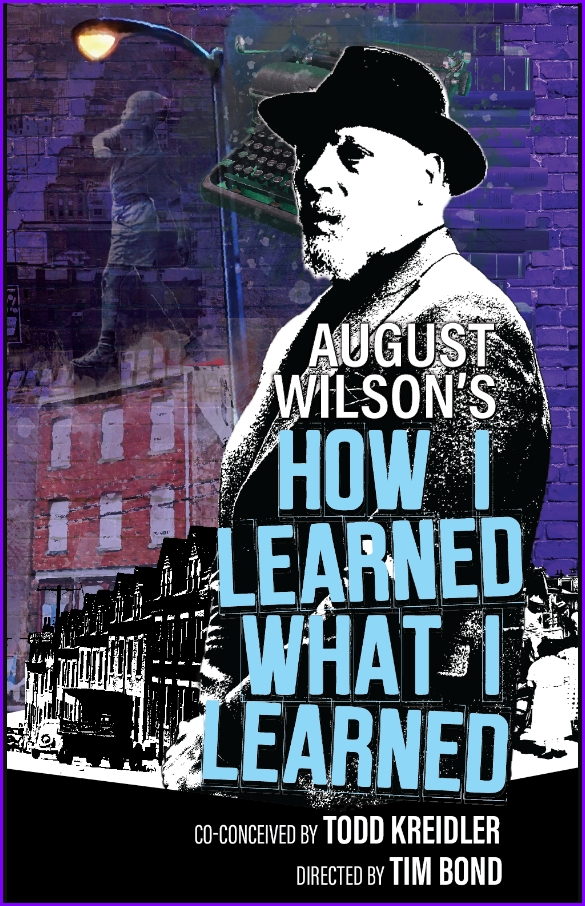By Joanne Engelhardt
Not many actors can stand on stage for 90+ minutes and talk with just a few sips of water – all the while keeping an audience mesmerized. Yet that’s exactly what Steven Anthony Jones does in August Wilson’s theatrical memoir How I Learned What I Learned.
As directed by former TheatreWorks Silicon Valley artistic director Tim Bond, an acclaimed interpreter of Wilson’s works, How I Learned is as mesmerizing as anything you’ll see on a Broadway stage. It runs through Feb. 3 at the Mountain View Center for the Performing Arts.
..shares the stage with a table, a chair & a gigantic wall of red bricks…
Co-conceived by Todd Kreidler, the show is a wondrous gift to Peninsula theatregoers who have the opportunity to see it. That’s because it forcefully relates so many difficult, lonely and unfair experiences that people like poor, black, uneducated Wilson experienced growing up after his family came to the United States.

“My mom came to Pittsburg in 1937,” Jones recalls, in Wilson’s voice. August, the fourth of six children, was born in 1945, and was immediately saddled with the “unfortunate circumstance” of being born black. “I was supposed to be white! I got that from Clarence Thomas,” he jests.
Wilson’s works examine the American condition, which is why he’s been referred to as theater’s poet of Black America. All the pain and suffering that both he and his family before him bore is clearly visible in his series of 10 plays collectively called The Pittsburgh Cycle. They include such award-winning plays as Fences, The Piano Lesson, and Ma Rainey’s Black Bottom.
Jones is a short, somewhat pudgy man who, as Wilson, hobbles around a bit on stage. As he meanders here and there, he doffs a beret, perches on a desk, sometimes turning his back on the audience for a second or two before winking and then continuing on an autobiographical journey.
This is his fourth time performing in Wilson’s one-man show since 2019. Over the years it’s obvious that what he says and does on stage has become more nuanced, more human, more real.
Jones shares the stage with a table, a chair and a gigantic wall of red bricks reaching high into the rafters. That wall is where a word or three appear up high – propelling him to segue into another story, another vignette, another unfairness.
Growing up, August had a few good friends he’d hang around with – friends that he’d stay close to all his life. But he clearly emphasizes that he’s his “mother’s son,” and she told him he had to get a job after school to help out with the family’s expenses. He endured many experiences of prejudice and unfairness, to the point where he’d finally quit a job rather than be treated that way. “Something is not always better than nothing,” he declares, once again quitting a job rather than being accused of something he didn’t do.
The takeaways are many in this 95+ minute presentation of Wilson’s life and literary evolution into becoming one of American’s most celebrated and influential playwrights. Equally telling are his observations on what it means to be a black writer and artist in the 20th century.
-30-
 Aisle Seat Executive Reviewer Joanne Engelhardt is a Peninsula theatre writer and critic. She is a voting member of the SF Bay Area Theatre Critics Circle (SFBATCC). Contact: joanneengelhardt@comcast.net
Aisle Seat Executive Reviewer Joanne Engelhardt is a Peninsula theatre writer and critic. She is a voting member of the SF Bay Area Theatre Critics Circle (SFBATCC). Contact: joanneengelhardt@comcast.net
| Production | How I Learned What I Learned |
|---|---|
| Written by | August Wilson; co-conceived by Todd Kreidler |
| Directed by | Tim Bond |
| Producing Company | TheatreWorks Silicon Valley |
| Production Dates | Thru Feb 3rd |
| Production Address | 500 Castro St. Mountain View |
| Website | www.theatreworks.org |
| Telephone | (877) 662-8978 |
| Tickets | $37- $82 |
| Reviewer Score | Max in each category is 5/5 |
| Overall | 4.5/5 |
| Performance | 4.75/5 |
| Script | 4.5/5 |
| Stagecraft | 4.25/5 |
| Aisle Seat Review Pick? | YES! |







